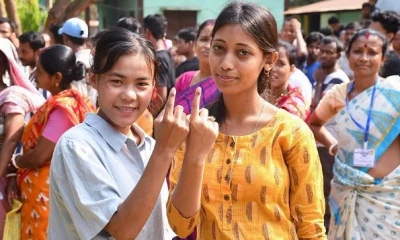In the heart of Assam’s Bodo territory, Kokrajhar witnesses a significant shift in focus from calls for separatism to a push for development in the Lok Sabha Elections of 2024.
Once adorned with slogans like – No Bodoland, No rest, Divide Assam 50:50 – advocating for Bodoland’s independence and the division of Assam, the walls of Kokrajhar now bear a different narrative. The fervent demand for a separate Bodoland State, championed by the Bodo community, has notably subsided. This transformation marks a departure from the longstanding agitation that defined previous electoral landscapes.
Notably, the leaders spearheading the movement for Bodoland’s autonomy now occupy positions of power within the Bodoland Territorial Council or BTC. This election season, the discourse has evolved towards prioritising the region’s development over the pursuit of separatism, signalling a new era of political dynamics in Assam’s Kokrajhar constituency.
Established in 2003, the Bodoland Territorial Council or BTC emerged as an autonomous governing body following the disarmament of the Bodo Liberation Tigers-BLT, an insurgent group that has since disbanded. Led by former BLT leader Hagrama Mohilary, the Bodoland People’s Front-BPF held control of the council until 2021.
In contrast to the scene before 2020, Kokrajhar’s streets are now bustling even late into the evening. Prior to this shift, the presence of army and CRPF personnel patrolling the streets, conducting vehicle checks, and the enforced closure of shops by 7 pm due to insurgency had rendered the city deserted after dark.
“Now you will find shops open till 11 pm in some places,” said Bodo youth Binoy Narzary, who runs a mobile phone store. Multiple food delivery partners can be seen near restaurants at Jwhwlao Dwimalu Road or JD Road.
While political parties strategise and form alliances, the overarching theme of peace has become a significant factor for the general electorate.
“Bomb blasts, firings, kidnappings, bandhs were the order of the day. From communal and ethnic clashes to counter-insurgency operations, we have seen it all. It has only been the last few years that we have seen sustained peace,” said a local entrepreneur on the condition of anonymity.
From having to give up his first car to the bank against unpaid instalments as business was bleak at the turn of the century, Das currently possess two vehicles and operates many more under his travel agency.
Echoing similar views, Newton Narzary, who runs a hotel near Raimona National Park and also drives a tourist gypsy, mentioned, “It used to be only uncertainty and fear, no matter to which community you belonged to. Let alone tourists, we locals feared to move out alone after dusk. But we have a bustling business now.”
Many maintain that the return of peace has been plausible with the inking of 2020 deal by the Central and the State governments with different Bodo groups, including NDFB, and surrender of almost all significant militant groups active in BTR.
“Naba Sarania had won by playing the Non-Bodo Card, but he did nothing in 10 years. We won’t fall for such gimmicks again, but we will definitely look for someone, who will give equal voice to all of us,” said Basugaon’s retired government official Pramod Sharma.
“The first step towards development has been taken with sustained peace. We are now hoping that whoever wins will take it forward,” added an optimistic Prasenjit, who works in a private firm, summing up the aspiration of peace and development of the voters.
“People are happy with the way we restored peace and bridged the trust deficit among the Bodos and non-Bodos,” said United People’s Party Liberal or UPPL chief Pramod Boro.
“There has been no violence in BTR since we took over. We are also ensuring development and all-round growth of the people. People have seen the misrule of BPF and Congress, and are ready to send our candidate to Parliament,” he claimed.
UPPL, an ally in the BJP-led government with seven MLAs, is the party heading the BTC since 2021. Pramod, former president of the influential All Bodo Students’ Union or ABSU, which headed the Bodoland Movement, convinced all four factions of the insurgent group, NDFB to give up violence and sign the pact. Close to 1,800 insurgents belonging to NDFB and Adivasi groups gave up arms and joined the mainstream.
“Apart from peace, the amount of development work we have undertaken since 2021 will help us win in Lok Sabha elections for the first time,” said Boro recently.
BJP is supporting ABSU’s former vice-president and UPPL’s Joyanta Basumatary for the Kokrajhar Lok Sabha seat. BPF, which was an ally of BJP till 2021, has fielded former minister Kampa Borgoyari while Congress has named Garjan Mushahary for the May 7 polls.
Despite having only 35 per cent Bodo population, Kokrajhar elected Bodo leaders to Lok Sabha since 1957, barring in 2014 and 2019 when Naba Kumar Sarania, a non-Bodo and a former “commander” of insurgent group Ulfa, got elected. Sarania won the elections banking on his Bodo-non Bodo equation. The scenario, however, changed as Sarania’s nomination was rejected this time after his Scheduled Tribe (ST) certificate issued in 2011 was rejected by Gauhati High Court, recently.
Pramod, however, claimed that the Bodo-non Bodo equation was no longer relevant in BTR as UPPL bridged the trust deficit among communities by ending militancy. “We are constantly reaching out to all non-Bodo communities to understand and address their problems,” he said.
The Kokrajhar Lok Sabha constituency comprising Kokrajhar, Chirang and Baksa has 58 per cent non-Bodo votes. Koch Rajbongshis, Adivasis, Bengali Hindus and Muslims are key stakeholders.

















